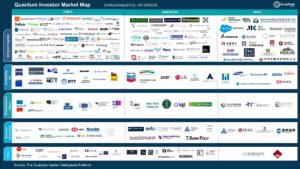Deep tech science entrepreneurs – and particularly quantum science entrepreneurs – have more than a few hurdles facing them from the start.
One of the leading challenges: Scientists have spent most of their lives dedicated almost exclusively to learning about a single field and often very specific subjects within those fields. In the case of quantum tech, these scientists are consumed by one of the most complex, often baffling subjects. Scientists, therefore, have little time or energy to focus their attention on another complex, often baffling subject called venture capital.
Besides a lack of familiarity with venture capital, there’s another reason for this science-investment bridge. Most science entrepreneurs who are considering starting a business based on their research or scientific advances realize quickly that quantum technology is a capital intensive endeavor. Few could bootstrap it with their own funds and, therefore, would need to enlist the help of deep tech-savvy venture capitalists.
The following information isn’t meant to be presumptuous and isn’t meant to insult the intelligence of a scientist considering such a business venture. Many scientists are equally adept at business and finance. However, this guide is meant to help some scientists who may feel more comfortable around wave functions than business functions.

In an era where quantum technology is drawing more interest from investors, startups in this space are bridging the gap between theoretical physics and practical applications. However, transforming groundbreaking scientific discoveries into commercially viable products often requires more than just an innovative idea; it demands substantial financial backing. This is where venture capital (VC) steps in, providing a lifeline to those ventures that hold the promise of revolutionizing technology but lack the necessary funds to accelerate their growth.

Understanding Venture Capital
At its core, venture capital is considered a subset or earlier stage of private equity, specifically designed to support startups with the potential for exponential growth. Unlike loans from traditional financial institutions, venture capital is invested in exchange for equity in the company. This form of financing is particularly suited to high-risk, high-reward enterprises like quantum technology startups, where the path to profitability is uncertain, and the investment required is substantial.
How Venture Capital Firms Operate
Think of VC firms as capital aggregators, pooling funds from individuals, corporations and institutional investors to inject into promising startups. Typically, these firms are not just funders; they are partners, offering mentorship, strategic advice, and access to a vast network of industry connections. The goal is not merely to fuel early-stage companies but to guide them towards a stage where they can either go public or be acquired, providing a significant return on investment.
Benefits of Venture Capital
Deep tech companies are capital-intensive operations. Initial funds are needed for equipment and salaries can be on the high-end of the range. The infusion of venture capital, therefore, can be more than transformative for quantum tech startups, it can be absolutely essential. Startups would likely never make it out of the lab without the funds. Benefits, however, the total benefits go beyond funds. You might want to classify the main benefits as capital, coaching and connections:
- Capital for Scaling: Essential for startups that require significant investment in research and development before achieving profitability.
- Mentorship and Strategic Guidance: Many VC firms boast a roster of experienced entrepreneurs and industry specialists who can provide invaluable insights and advice.
- Access to Networks: From potential customers and partners to future investors, the networks provided by VC firms can open many doors.
Drawbacks of Venture Capital
However, venture capital is not without its challenges. Accepting VC funding means relinquishing a portion of equity and, potentially, some control over the company. Moreover, the pressure to deliver rapid growth can be intense, leading some startups to prioritize scale over sustainability. It’s also crucial for startups to ensure their vision aligns with their investors, as misalignments can lead to strategic conflicts.
For a quantum technology startup to attract venture capital, it must demonstrate:
- A Groundbreaking Product: Innovation is key, with a clear competitive edge over existing technologies.
- Market Potential: A viable path to significant market penetration and profitability.
- A Strong Team: Capable of executing the business plan and adapting to challenges.
- Commitment to Growth: A readiness to scale operations and explore new market opportunities.
Case Studies of VC in Quantum Technology
Venture capital plays a pivotal role in advancing quantum computing by providing the necessary funding and strategic guidance to startups. Perhaps this is too strong, but it’s unlikely the quantum computing industry would exist in any form right now.
Here are a few examples of quantum tech leaders who received backing by venture capitalists.
IonQ
IonQ is a leader in trapped-ion quantum computing, focusing on building quantum computers that are scalable and can outperform classical computers for certain tasks.
Venture Capital Influence: IonQ has raised substantial funding from venture capital firms like Cambium, a multi-stage venture capital firm focused on investments in the future of computational paradigms, Tao Capital Partners and Correlation Ventures, among others.
This investment has been crucial for IonQ to scale its technology, enhance its quantum hardware, and expand its reach into various industries. It is now a publicly traded company.
PsiQuantum
PsiQuantum is working on building a commercially viable quantum computer using photonic technology, aiming to create a system with millions of qubits.
Venture Capital Influence: The company has secured significant venture capital investment from firms like BlackRock, Microsoft’s M12, and Playground Global. This funding supports PsiQuantum’s ambitious goal of scaling up its quantum computing technology to a level that could revolutionize various sectors, including healthcare, finance, and energy.
Quantum Machines
Background: Quantum Machines specializes in the development of quantum control hardware and software, aiming to enhance the performance and speed of quantum computers.
With funding from investors like Battery Ventures, TLV Partners, and Atreides Management, Quantum Machines has been able to advance its Quantum Orchestration Platform, which is designed to operate and optimize quantum computing systems.
Outcome: The company’s technology is being used by researchers and industry leaders to accelerate quantum computing experiments and developments, signifying a key contribution to the quantum computing ecosystem by improving the reliability and functionality of quantum systems.
Q-CTRL
Q-CTRL focuses on quantum control engineering to improve the performance of quantum computing devices. It offers software that helps mitigate errors in quantum computing systems, which is one of the major challenges in the field.
Venture Capital Influence: Backed by venture capital firms like Square Peg Capital, Sierra Ventures, and Sequoia Capital, Q-CTRL’s funding has enabled it to develop advanced quantum control solutions that can be applied across various quantum computing hardware platforms.
Resources and Toolkit
For quantum tech entrepreneurs ready to explore venture capital, the following resources are invaluable:
- Quantum Technology Trade Associations: Offering networking opportunities and insights into industry trends.
- The Quantum Insider and The Quantum Insider Intelligence Platform: Shameless plug but we try to be a resource for startups looking to connect with investors. Our media and data platform can help identify potential investors with interest in quantum technologies.
- Pitch Deck Templates: Essential for articulating your startup’s value proposition to potential investors.
- Financial Modeling Guides: Helping to project financial performance and growth potential.
- Legal and Regulatory Resources: Critical for navigating the complexities of VC funding and protecting intellectual property.
What Questions Should You Ask and Why?
It’s good to have at least some idea of what you will need to know in those initial meetings with interested investors. Here are a few suggestions for top-of-mind questions to help shape the conversation:
-
- What is your investment thesis and how does our project align with it?
Understanding the VC’s investment focus — whether it’s on a particular technology, stage of company growth, or market — can help gauge how well your project fits their portfolio strategy. - Can you share examples of similar deep tech investments and their outcomes?
This question helps assess the VC’s experience and success rate with deep tech startups, providing insight into their understanding of the challenges and timelines specific to deep tech ventures. - What value beyond capital do you bring to your investments?
Venture capital should offer more than just money. Inquire about the firm’s network, mentorship, strategic guidance, and any other support services they provide. - What is your typical investment horizon and exit strategy for deep tech startups?
Deep tech projects often have longer development timelines. It’s important to know if the VC’s expectations for returns align with the realistic timeline of your project.
- What is your investment thesis and how does our project align with it?
- How do you typically structure your investments in deep tech companies?
Understanding the financial terms, including valuation, equity stake, dilution, and any special conditions like milestone-based funding, is crucial before moving forward.
- Can you describe your involvement with portfolio companies?
Gauge how hands-on the VC likes to be. Some provide significant operational support, while others prefer a more hands-off approach. Consider what level of involvement you’re comfortable with.
- What are the most common challenges your deep tech investments face, and how do you help them navigate these challenges?
This question can reveal the VC’s depth of understanding of the deep tech landscape and their proactive measures to support startups through inherent industry challenges.
- How do you view failure, particularly in high-risk deep tech ventures?
This might be a risky – no pun intended – one, but it should be considered. The VCs’ response can provide insight into the VC’s risk tolerance and their approach to setbacks, which is particularly relevant in the high-stakes world of deep tech. - What is your process for follow-on investments?
Knowing whether the VC has a track record of providing additional funding rounds can be crucial for long-term planning, especially since deep tech projects may require multiple rounds of funding. - Can you provide references from other deep tech companies in your portfolio?
Speaking with current or past investees can offer valuable insights into the VC’s working style, commitment, and impact on their investments.
VC Terms And Their Definitions:
Understanding the following terms can help entrepreneurs navigate the complexities of venture capital financing more effectively, ensuring they’re better prepared to negotiate terms and understand the implications of the agreements they enter into.
Term Sheet: A non-binding document outlining the basic terms and conditions under which an investment will be made. It serves as a template to develop more detailed legal documents.
Equity: Ownership interest in a company. Venture capitalists receive equity in exchange for the capital they invest, giving them a share of the company’s profits and losses.
Dilution: The reduction in existing shareholders’ ownership percentages that occurs when a company issues more shares, often due to new investors coming in.
Valuation: The process of determining the current worth of a company. Pre-money valuation refers to the company’s value before receiving the investment, while post-money valuation includes the investment amount.
Cap Table (Capitalization Table): A table providing an analysis of the company’s percentages of ownership, equity dilution, and value of equity in each round of investment by founders, investors, and other owners.
Convertible Note: A short-term debt that converts into equity, typically in conjunction with a future financing round; the investor loans money to a startup with the intention that the loan will convert into shares of preferred stock during the equity financing.
SAFE (Simple Agreement for Future Equity): An agreement between an investor and a company that provides rights to the investor for future equity in the company without determining a specific price per share at the time of the initial investment.
Liquidity Event: An event that allows initial investors to sell their shares and potentially realize gains on their investments. Common examples include an IPO (Initial Public Offering) or an acquisition.
Vesting: The process by which an employee earns their stock options over time. This is designed to incentivize the employee to stay with the company for a longer period.
Burn Rate: The rate at which a company is spending its capital to finance overhead before generating positive cash flow from operations. It’s a measure of negative cash flow.
Lead Investor: The venture capital firm or individual that organizes a round of financing, invests a significant portion of the capital, and usually negotiates the terms of the investment on behalf of other investors.
Due Diligence: The comprehensive appraisal of a business undertaken by a prospective buyer, especially regarding its assets, liabilities, and commercial potential, before making an investment.
Exit Strategy: The method by which a venture capitalist or business owner intends to get out of an investment that they have made in the past. This could be through selling the company, public offering, or other means.
Preferred Stock: A class of ownership in a corporation that has a higher claim on its assets and earnings than common stock. Preferred shares generally have dividends that must be paid out before dividends to common shareholders and the shares usually do not carry voting rights.
Drag-Along Right: A legal concept that allows majority shareholders to force minority shareholders to join in the sale of a company. The minority shareholders must sell their shares at the same terms as the majority shareholder.
No matter where you land on your decision to secure venture capital funding, we wish you best of luck in this journey – and any journey of a quantum technology startup from concept to market is exciting and challenging. And one of those exciting-slash-challenging moments is securing the necessary funding to fuel growth. Venture capital offers a pathway, not just through financial investment but through the strategic support and networks that come with it. Understanding how to engage with the VC ecosystem, from crafting a compelling pitch to aligning with the right investors, can make the difference between stagnation and success.
Quantum technology entrepreneurs stand at the threshold of a new technological revolution. With the right approach to venture capital, they have the potential to not just participate in but lead this revolution, transforming their groundbreaking ideas into realities that could redefine the future.
This guide serves as a starting point for quantum tech entrepreneurs embarking on their venture capital journey. By leveraging the outlined resources and insights, startups can navigate the VC landscape with greater confidence and clarity, turning visionary scientific achievements into successful, scalable businesses. The road ahead is challenging, but for those who navigate it wisely, the rewards can be revolutionary.
Best of luck in the next steps of this journey!
For more market insights, check out our latest quantum computing news here.















